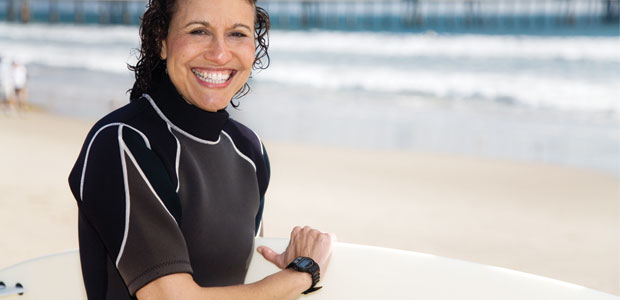Advertisement
Fabulous Over 50
Earlier this year, the Toronto Star ran an article about the perfect baby boomer couple who lives such a well-balanced life, complete with daily urine dehydration checks, that you’re awed–until you get to the end of the article and discover the kicker: the whole story’s a joke. For years, images of baby boomers with radiant … Continued

Earlier this year, the Toronto Star ran an article about the perfect baby boomer couple who lives such a well-balanced life, complete with daily urine dehydration checks, that you’re awed–until you get to the end of the article and discover the kicker: the whole story’s a joke.
For years, images of baby boomers with radiant skin and gleaming teeth have appeared in the media, but only now are we acknowledging that not everyone in their fifties looks and feels healthy enough to appear in a toothpaste ad. Growing evidence suggests that the generation now approaching their golden years is the first to enter retirement in worse health than their parents.
But had the Toronto Star reporter visited the Alta Vista Naturopathic Clinic in Vancouver, she just might have found that elusive, age-defying boomer in the body of naturopathic physician Vince Lurie or one of his patients. Dr. Lurie, who runs a practice for baby boomers and older (luriehealth.com), sees many patients raring to get healthier and stay healthier–for longer.
A Health Snapshot
Many of us may not be as healthy as we think. In an eye-opening study funded by the American government and released earlier this year, University of Pennsylvania researchers examined 5,030 adults born between 1948 and 1953 and discovered that current fifty-somethings report feeling less hale and healthy as compared to groups born between 1936 and 1941, and between 1942 and 1947.
Participants reported more mobility problems doing day-to-day things such as climbing stairs, standing up from a chair, or lifting 10 pounds. They have more chronic health issues, including high cholesterol, high blood pressure, and diabetes. The researchers caution that this data isn’t definitive. Lots of questions remain. Are mid-lifers really sicker, for instance, or are they being diagnosed earlier?
A Weighty Concern
Either way, Canadian baby boomers could be in a similar boat. For one thing, we share similar rates of obesity with the Americans and we share its host of debilitating health challenges. More than 23 percent of adult Canadians are obese, with rates peaking around 30 percent for people between the ages of 45 to 64. You can bet Health Canada is wondering how this health problem will affect the health care of tomorrow’s seniors. Between 2006 and 2026, the number of seniors is projected to increase from 4.3 million to 8 million. Seniors will comprise 11.9 percent of the population.
The good news is that today’s boomers are less likely to smoke, and the average lifespan is increasing. At the beginning of the 20th century, the average Canadian could expect to live 78.3 years; now our life expectancy is 84.2 years.
For the baby boomers who find their way to Dr. Lurie’s clinic, it’s not just length of life that’s of interest–it’s quality of life. “Many people don’t care about their health until they lose it and then there’s a big scramble,” he says. “But some people are taking a proactive approach, which definitely makes a difference.”
Information Agers
Another advantage for our middle-aged population is that we are more educated and Internet savvy than in the past. The Internet has opened up a world of information about options that older generations might not have known about or had confidence in. “People used to blindly accept what their doctor said, but that’s not happening anymore,” agrees Dr. Lurie. “They’re questioning diagnoses. They are more aware and they are doing their research.”
With complementary and alternative medicine (CAM), for example, only 5 percent of Canadian seniors 75 and older use it, according to a 2006 Portrait of Seniors by Statistics Canada. In comparison, 16 percent in the younger 25 to 54 age group use the services of a massage therapist, homeopath, naturopath, or acupuncturist. Federal researchers speculate that our aging population may increase demand for a variety of natural therapies in the future.
Similar results from a new collaborative survey by AARP (formerly the American Association of Retired Persons) and the National Center for Complementary and Alternative Medicine support this idea. Nearly half of all American adults aged 18 and older have used CAM in their lifetime. More than one-third of American adults have used CAM in the past year, and Americans between 50 and 59 are most likely to use it.
“A baby boomer should have a health advisory team,” says Dr. Lurie. “A naturopathic physician, a medical doctor, a personal trainer, and a financial planner–people who can work with them to achieve the best possible retirement.” At Lurie’s clinic herbal medicine, homeopathy, chelation therapy (for heart and circulation), and Bowen therapy (for musculoskeletal issues) are just a few therapies offered alongside nutritional counselling.
Many of Lurie’s patients have achieved positive health results, including patients with bladder disease who ended up being able to cancel their surgery appointments; Alzheimer’s patients with improved cognitive function; and chronic fatigue patients who were off work for years but eventually went back to working full time.
“A lot of my older patients are very motivated to be active,” says Dr. Lurie. “Many of them in their seventies exercise daily. They walk miles and miles. And they don’t look old. Some of these people have a biological age in their fifties. The [holistic] lifestyle is working for them. They’ve taken control of their lives.”
Baby boomers bursting with life do exist, but they’re not yet the norm. Perhaps the stereotypical media image of the clear-eyed, smiling baby boomer is an ideal to live toward. In the meantime, Canada’s middle-aged population seems to be a heterogeneous bunch affected by more health and life concerns than which natural toothpaste to buy.
A Modern Recipe for Health
At the Alta Vista Naturopathic Clinic in Vancouver, Dr. Vince Lurie says diet and nutrition are fundamental to most health issues.
“I tell all my patients that sugar is the enemy. It’s implicated in all chronic disease and those who can avoid sugar completely are the people who do better. People who can’t give up sugar and refined foods like white breads and white rice are those who usually meet a lot of health problems as they age.”
For baby boomers and older, Dr. Lurie recommends a multivitamin and a quality bone support supplement with calcium, magnesium, and vitamin D, with the emphasis on quality, as he says products on the market vary enormously in absorption.
“Vitamin C is the other must-have,” he says, adding, “I often recommend garlic because it helps with cholesterol issues.”
These are the basics, after which the clinic usually adds other supplements and/or remedies specific to a patient’s condition.
Not to be forgotten are physical and mental activity, which Dr. Lurie says are vital to being proactive in health.





